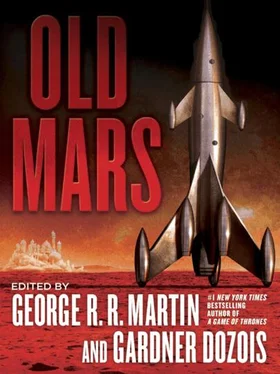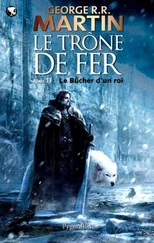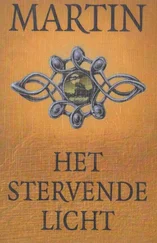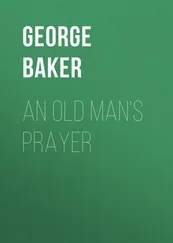The men looked for him all day, but Mather remembered the Martian hunting skills he’d acquired from the memory-visions—that’s what he had taken to calling the phenomena—and he had no trouble avoiding capture. In the evening, the searchers climbed into the jeep and drove off across the empty sea. From the hills, he watched their dust plume hang in the air almost motionless, so slowly did the fine particles sift down in the lesser gravity and the windless Martian air.
When full darkness fell, he went down to the town. He had discovered that the lines incised into the walls of the houses performed a similar function to those graven into the sides of the cube. But, whereas the latter were memory-visions of public events, the ones in the houses were of private occasions. They were the Martians’ family photo albums.
At first, he had thought he should disable the machine completely, to save these intimate records. But after sampling several, he realized that they were all much the same: memories of births and deaths and unions, naming-day ceremonies, and other mundane rites of passage. But each was imbued with the same soft sadness that permeated the communal gatherings. These were not records taken from the middle of a community’s life but from its end. They were memorials, left by the long-ago Martians when they packed up their possessions, and, leaving the doors of their houses open, went away forever.
Red Bowman was not happy. He had a production schedule to fulfill. Having the automated miner standing idle because crazy Mather had interfered with its controls threatened the crew chief’s chances of winning the substantial bonus that would be due him if he delivered truckloads of bone fertilizer before the specified date. So when the jeep had gone far enough out across the seabed, he stopped it and got off, sending it on to base with the other men while he walked back along its vague track, trudging through the fine dust to the bone town.
Night fell before he got there, but he could see the white towers glimmering before him, occasionally lit by sparks and flashes as the tireless machine that was grinding its way through the walls encountered metal. But even if he’d been blind, Bowman could have found his way just by going toward the sound of the diesel engines. Or by the stench of its exhaust.
He came up the harbor steps and crossed the plaza. The sea beast’s image was almost completely defaced by the miner’s tracks. The behemoth’s mechanical growls faded as it turned a far-off corner in its programmed course, putting walls between it and the Earthman. Bowman used the lull to listen for sounds of Mather’s moving about the town. In a few moments, he heard something.
At first, he thought it was a wind wuthering beneath a building’s eaves. But there was no wind, and the Martians’ roofs were flat and no wider than the walls that supported them. He moved in the direction of the sound. It was coming from across the plaza, from one of the larger buildings that the behemoth would not reach for a couple of days.
The place had a bronze door, figured in the flowing script that Bowman did not like to look at; it reminded him of snakes, and snakes reminded him of the Devil. He sometimes wondered if there had been a deal between God and Lucifer: God would rule on Earth and the Devil would have Mars.
He eased through the door, a flashlight ready for use in his left hand, a pistol in his right. He didn’t want to have to shoot Mather, but everybody knew the story of the man on the early expedition who’d gone mad and murdered his crewmates. He thought the fellow might have been an archaeologist—some kind of ologist, for sure—and he’d gone kill-crazy after rubbing up against too much Martian evil.
The sound came again, a keening, crooning note without words. It was like something a cat would sing, Bowman thought, maybe to a mouse it had caught. He didn’t like cats either. Killing was all right when you had to, really had to, but you ought to do it clean.
He could dimly see the general layout inside the building: an open space, seats or steps in descending circles, a great white shape at the bottom. The sound came from the opposite side, louder now that Bowman was inside the place and the hoo-hooing was echoing so softly around the bone walls. The hairs on his neck and forearms rose of their own accord. He slid his thumb over his weapon’s safety catch, making sure it was off.
He edged around the upper deck of the amphitheater. Against the white vagueness, he saw a dark shape, seated halfway down the tiers. He readied the pistol, then thumbed the flashlight’s switch.
A Martian sat in the middle of the terraced seats, clad in a robe of metallic cloth that dully reflected the beam. His whole head was enclosed in a cloche-mask of silver, the facial features chased in gold, the thin eyebrows elevated, and the mouth pursed in an expression of permanent surprise. Bowman could not see the color of the eyes through the mask’s slits, but the figure’s gaze did not turn to him. Instead, it remained fixed on the side of the cube down in front.
The Earthman played the flashlight’s beam over the man. He could see the hands, five-fingered instead of six. From beneath the robe came the cuffs of the blue jeans they all wore, and the scuffed boots were also New Ares company issue.
“Mather!” Bowman called. The man in Martian garb gave no sign of having heard. The crew chief moved in on the runaway, keeping the beam on him, with the pistol lined up just beside and behind the flashlight. “Mather!”
The masked head did not turn, the limbs did not move. Bowman stood beside him, poked his shoulder with the muzzle of the gun. “Snap out of it!”
Still no response. Bowman set the flashlight down on one of the tiered seats so that it illuminated the still figure. Then he hooked his fingers below the rim of the head-enclosing mask and yanked upward.
The Martian warriors marched to battle in gleaming companies of 144. Six companies made a battalion of 864. They carried shields of hammered bronze that matched their burnished armor and guns capable of spitting streams of metal insects that, finding flesh, would sting and burrow. On their flanks and scouting ahead raced knee-high electric spiders, their joints clicking with a rhythm that combined into a continuous whir.
Six battalions had gone out through the bone gate of Ipsli, almost the town’s entire male complement. They took the coastal road toward Huq, and, by midday, they arrived at the chosen field, a place where the hills fell back to widen the coastal plain. They formed up, four battalions in front, two in reserve, and sat down to await the enemy.
The Huq army came late, earning themselves some justified mocking from Ipsli. Questions were shouted across the open ground as to whether they’d had something better to do today, whether their beds had been too comfortable to leave. Or their wives.
The Huq replied with taunts of their own, recalling past encounters when Ipsli’s war aims had not been realized. Then the heralds went to meet in the space between the two hosts, to decide on the order of battle. As usual, it would be individual combats first, then small groups. Ipsli’s first battalion was anxious for a rematch with their Huq counterparts; it was felt that last year’s engagement was decided more by the state of the ground—it had rained the night before—than by the relative skills of the combatants.
Youths fought first, with minimized weapons. Then came the midranked warriors, in pairs and quatrains. Ipsli was doing well, only two deaths and one maiming, while several Huqs had had to be carried from the field. Sentiment within the ranks was leaning toward ending the day with a general melee.
There came a break for lunch while the spiders fought their bouts. Huqs and Ipslis wagered against each other on the outcomes, the heralds holding the takes and disbursing the winnings. Then it was time for individual champions to take the field.
Читать дальше












